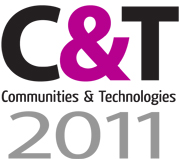AoIR IR 11.0: Academic Career Development Workshop for Research Students and Early Career Academics
Academic Career Development Workshop for Research Students and Early Career Academics
in conjunction with Internet Research 11, Gothenburg, Sweden, 20 October 2010
http://ir11.aoir.org/program/pre-conference-workshops/
Description
For research students and early career academics, universities offer resources that help develop their research skills – for example, critical theory development, literature reviews, research methods, data analysis, writing skills, etc. However, building a successful career in academia poses a wide range of new challenges in addition to the pure academic craft of research. The resources and resilience one needs in order to shape an academic career path often appear ambiguous, particularly in the innately transformative field of Internet research. In response to feedback from AoIR members, this full-day workshop seeks to address this concern by offering a supportive and constructive environment to discuss career development related issues that are of specific interest to research students and early career academics.
The first half of the workshop is devoted to the process of transitioning into research student training and supervision. In the second half, we will look at issues of academic leadership. The workshop chairs, along with invited senior academic researchers, will share with the participants some of their off-the-record insights of their career development milestones and the related decisions that have shaped their career paths. The workshop chairs will act as facilitators and moderators who will encourage the participants to join the discussion and share their own views and experiences with the rest of the group. The goal is to establish a peer support atmosphere that bridges disciplinary, cultural, and regional differences in order to distill the common skills and capabilities that are necessary to identify and seize opportunities for shaping one’s own career trajectory in academia. The main topics of discussion for each session will be negotiated with the participants on the day. This is to make the workshop as relevant and practical to the participants as possible.
Schedule
The following is the proposed activity plan:
09.00 – 12.00 Research training and supervision
- Building a track record
- On and offline communication and collaboration tools
- Mode of Thesis: Monograph / By Publications / Exegesis
- New ways of building and communicating knowledge
12.00 – 13.00 Lunch
13.00 – 17.00 Academic leadership
- Identifying significant research trends and building momentum and engagement
- Building and managing a multidisciplinary research team
- Social media tools for research and stakeholder relationship management
- Recruiting research partner organisations and liaising with external stakeholders
- Project management and research budget accounting
- Human resources: recruitment, performance planning, and review
- Research-teaching nexus
- Promotion and tenure
The final selection of the invited senior academics is to be confirmed.
Fees & Logistics
- Date: Wednesday, 20 October 2010
- Time: 9:00 a.m. – 5:00 p.m.
- Location: Chalmers student union building, room TBA.
- Fee: 330 SEK
- Lunch and coffee included.
- Facebook event entry: http://www.facebook.com/event.php?eid=110293655687140
Submission & Participation
The number of participants in this workshop is limited to 25. If you are interested in attending, please send an email by 1 Sep 2010 to both workshop organisers with a single PDF file that contains:
- Your name,
- Affiliation,
- 200 word biography,
- 200 word statement expressing your career aspirations, and what you hope to get out of your participation in this workshop.
Contact
Associate Professor Marcus Foth
Email: m.foth AT qut.edu.au
Dr Jaz Hee-jeong Choi
Email: h.choi AT qut.edu.au
Web: www.nicemustard.com
Organizers
Associate Professor Marcus Foth is Principal Research Fellow with the Institute for Creative Industries and Innovation, Queensland University of Technology (QUT), Brisbane, Australia, and founder and team leader of the Urban Informatics Research Lab. He received a QUT Vice-Chancellor’s Research Fellowship (2009-2011), and a Smart Futures Fellowship from the Queensland State Government (2009-2011), co-sponsored by National ICT Australia (NICTA). He was awarded the inaugural Australian Business Foundation Research Fellowship on Innovation and Cultural Industries 2010 sponsored by the Aurora Foundation. He was an ARC Australian Postdoctoral Fellow (2006-2008), and a 2007 Visiting Fellow at the Oxford Internet Institute, University of Oxford, UK. Dr Foth’s research explores human-computer interaction design and development at the intersection of people, place and technology with a focus on urban informatics, locative media and mobile applications. The high quality of his research work has attracted over $1.7M in national competitive grants and industry funding since 2006. Dr Foth has published over 70 articles in journals, edited books, and conference proceedings. He is the editor of the Handbook of Research on Urban Informatics (2009), and is currently co-editing the book “From Social Butterfly to Engaged Citizen” for MIT Press (2011). He was on the AoIR Executive Committee between 2007 and 2009. He is the conference chair of the 5th International Conference on Communities and Technologies 2011 in Brisbane.
Dr Jaz Hee-jeong Choi is an ARC Australian Postdoctoral Fellow (Industry) at the Institute for Creative Industries and Innovation, Queensland University of Technology (QUT), Brisbane, Australia. Her research interests are in playful technology, particularly the ways in which various forms of playful interaction are designed, developed, and integrated in different cultural contexts. In her recently completed doctoral research, she developed a new conceptual approach to urban sustainability that recognises ‘play’ as the core of transformative interactions in cities as ubiquitous technosocial networks. Her current research explores designing and developing playful ubiquitous technologies to cultivate sustainable food culture in urban environments. She has collaborated with leading international researchers and published across various disciplines, which as been a fun journey, but she is looking forward to even more – or some would say, ‘the real’ – fun to come.


